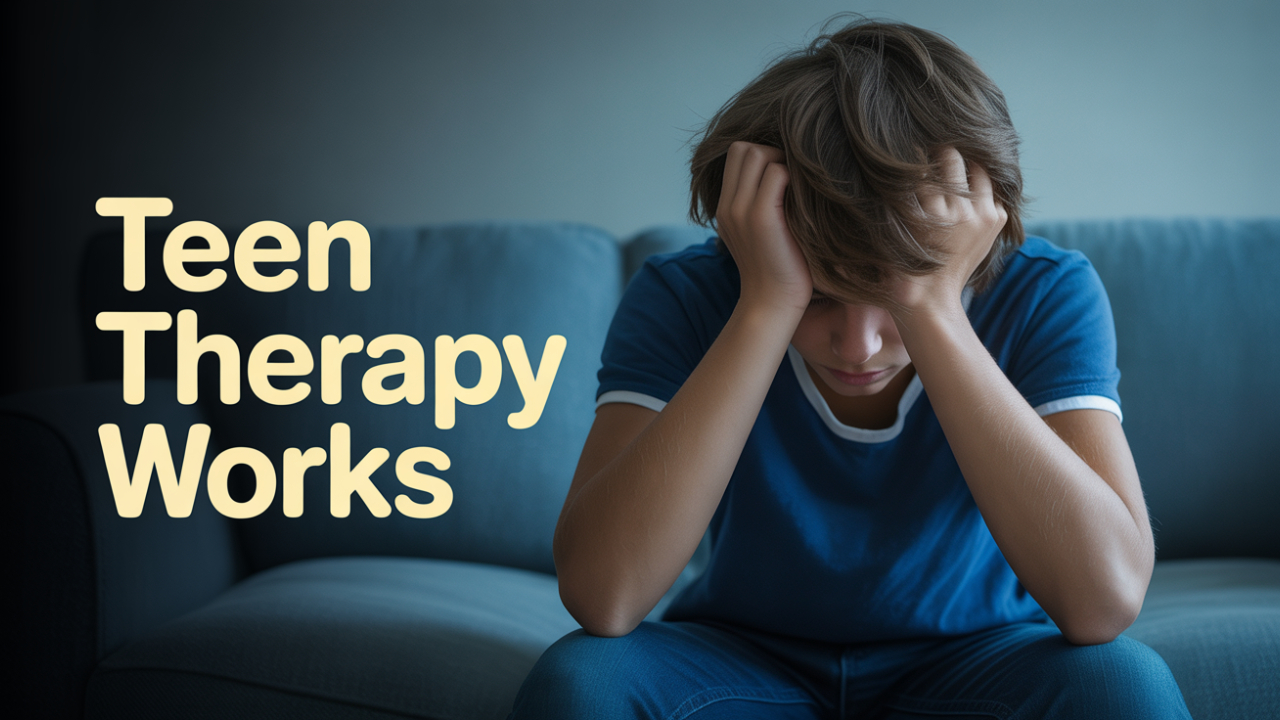Does Therapy Help Troubled Teens?
Troubled teens often experience emotional and behavioral issues that disrupt their health, education, and relationships. These struggles may include impulsivity, irritability, addiction, emotional dysregulation, sleep disturbances, or aggression. Many parents wonder: Does therapy help troubled teens? The answer is yes. Therapy provides structure, emotional insight, and behavioral strategies that help teens manage their challenges and improve their quality of life.
At Adolescent Mental Health in Orange County, California, we offer accessible therapy options designed to support youth and their families. We believe that with the right therapeutic relationship and reinforcement, teens can build resilience, strengthen coping skills, and foster personal development.
Why Teens Struggle
Adolescents go through major psychological, emotional, and physical transitions. During this time, they form their identity, seek independence, and navigate new pressures. These dynamics can trigger emotional distress or behavioral changes that are difficult to manage.
Common causes of emotional or behavioral difficulties include:
Mental disorders such as anxiety disorder, major depressive episode, or attention deficit hyperactivity disorder (ADHD)
Exposure to abuse, domestic violence, or bullying
Divorce, grief, or death in the family
Cyberbullying, peer pressure, or social anxiety
Substance abuse or addiction
Academic stress and reputation concerns
Feelings of shame, sadness, loneliness, or anger
Issues with gender identity or emotional intelligence
When teens face these challenges without support, they may struggle with motivation, learning, or maintaining healthy relationships. That’s why early intervention through therapy is key.

How Therapy Helps Troubled Teens
Therapy provides a safe, confidential space for teens to express emotion, explore thoughts, and build healthier behavior patterns. It allows them to develop insight into the cause of their distress and apply direct strategies to feel better.
1. Behavior and Emotional Regulation
Teens often act out due to emotional overload or unmet needs. Therapy helps teens identify triggers and manage feelings like anger, anxiety, or panic. Skills like distress tolerance, anger management, and emotional control are taught to reduce reactive behavior and improve mood.
2. Mental Health Support
Therapists treat a range of mental disorders, including depression, anxiety, personality disorder, and disruptive mood dysregulation disorder. With consistent care, teens learn how to cope with these conditions, adjust their thinking patterns, and reduce distress.
3. Improved Coping Skills
Therapy teaches teens how to manage stress and navigate challenging situations. Techniques like mindfulness, meditation, journaling, and problem solving help reduce emotional intensity and increase emotional intelligence.
4. Communication and Relationship Skills
Troubled teens often feel disconnected from caregivers, teachers, or their peer group. Counseling improves social skills, teaches empathy, and strengthens the teen’s ability to have healthy conversations with others.
5. Academic and Daily Functioning
Mental health challenges affect school performance and daily responsibilities. Therapy improves attention, reduces sleep disturbances and insomnia, and enhances confidence and goal setting—giving teens a stronger foundation for success.

Types of Therapy for Teens
At Adolescent Mental Health, we use research-backed therapies that meet the unique needs of adolescents. Some of our core approaches include:
Cognitive Behavioral Therapy (CBT)
CBT helps teens challenge negative thoughts and change unwanted behaviors. It’s effective for managing anxiety, depression, and anger.
Dialectical Behavior Therapy (DBT)
DBT helps teens build skills in distress tolerance, emotional regulation, and mindfulness. It’s often used for teens with borderline personality disorder, self-harm behaviors, or intense emotional reactions.
Art Therapy
For teens who struggle to express themselves verbally, art offers a creative outlet for processing emotion. Activities like painting, drawing, and collage support emotional awareness and self-expression.
Family and Couples Therapy
Family involvement is essential in teen recovery. Family or couples therapy sessions help address household conflict, improve parenting strategies, and promote mutual understanding between the teen and their caregivers.
Trauma-Informed Counseling
Many troubled teens have experienced trauma. Trauma-informed approaches create a supportive space where teens feel safe exploring pain and healing at their own pace.
How Parents and Caregivers Can Support the Process
Parents and caregivers play a key role in a teen’s healing. Their behavior, communication style, and emotional availability all influence the teen’s progress. Therapy may also involve sessions that include caregivers to improve family dynamics and understanding.
Ways caregivers can support:
Stay involved in the treatment process and maintain open communication with the therapist
Model coping skills by managing their own stress and emotion constructively
Avoid aggressive confrontation and instead use empathy and active listening
Recognize early signs of emotional distress, such as appetite changes, mood swings, or sleep problems
Support goal setting and celebrate progress, no matter how small

When to Seek Therapy
If your teen exhibits the following behaviors or feelings consistently, it may be time to seek professional help:
Extreme anger, aggression, or defiance
Withdrawal from friends, school, or the community
Anxiety, worry, or panic attacks
Sleep disruption or insomnia
Declining grades or refusal to attend school
Persistent sadness, shame, or hopelessness
Signs of substance use, addiction, or risky behavior
Self-harm, suicidal thoughts, or discussions about death
Acting early increases the likelihood of a positive outcome and gives the teen the tools to manage life’s pressures with resilience and confidence.
How Therapy Benefits Teens Long-Term
The skills learned in therapy last beyond the teen years. Therapy promotes personal development and empowers youth to make healthier decisions as adults.
Long-term benefits include:
Greater emotional regulation and self-awareness
Better social and family relationships
Reduced risk of future substance abuse or mental health decline
Increased coping skills and stress management ability
A stronger sense of identity and purpose
Therapy also builds rapport between teens and mental health professionals, reinforcing that help is available and health care matters.
Breaking the Stigma
Unfortunately, many teens hesitate to attend therapy due to fear, misunderstanding, or stigma. It’s important to normalize mental health care as part of overall well-being—just like going to a physician for physical pain.
Talking openly about therapy, using supportive language, and encouraging professional help can improve your teen’s perception and willingness to engage.
Your Partner in Teen Mental Health
At Adolescent Mental Health in Orange County, we offer personalized therapy for teens struggling with emotion, behavior, or mental health disorders. Our services are covered by many insurance providers and include individual therapy, group therapy, family counseling, and more. We aim to create a therapeutic relationship built on trust, insight, and understanding.
Whether your teen is dealing with panic disorder, bullying, phobia, grief, or gender-related stress, we are here to help. Our team includes psychologists, psychiatrists, and licensed therapists who are experienced in helping teens gain the emotional tools they need to thrive.
Final Thoughts
Therapy absolutely helps troubled teens. It provides structured support, teaches effective strategies, and builds emotional strength. For teens facing sadness, fear, anger, addiction, or any mental disorder, therapy is a proven way to regain balance, improve insight, and take charge of their future.
If your teen needs help, don’t wait. Reach out today to explore professional therapy options in Orange County that meet your family’s needs.
Frequently Asked Questions
1. How do I know if my teen needs therapy?
Look for changes in mood, behavior, sleep, or school performance. Warning signs may include persistent sadness, anger, panic attacks, substance use, or withdrawal from friends and family. If your teen talks about death, shows signs of depression, or engages in risky or aggressive behavior, therapy can help address underlying emotional or mental health concerns. Early intervention can prevent long-term damage and promote healthier coping strategies.
2. What types of therapy work best for troubled teens?
The most effective therapies depend on your teen’s specific challenges. Cognitive behavioral therapy (CBT) is helpful for anxiety, depression, and mood disorders. Dialectical behavior therapy (DBT) supports teens dealing with intense emotions, self-harm, or borderline personality disorder. Art therapy benefits teens who struggle to express themselves verbally. Family and couples therapy can also improve communication and dynamics at home. At Adolescent Mental Health, we match each teen with the right therapeutic approach based on their needs and personality.
3. Will my teen’s therapy be kept private?
Yes. Therapy is confidential, which helps build trust between the teen and therapist. However, if a teen discusses a serious risk—such as suicidal ideation, self-harm, or plans to harm others—mental health professionals are required to inform parents or appropriate authorities for the teen’s safety. Outside of those exceptions, sessions remain private to encourage openness, honesty, and emotional safety.
4. Can therapy help with issues like addiction, bullying, or family conflict?
Absolutely. Therapy addresses a wide range of challenges, including addiction, peer pressure, cyberbullying, abuse, grief, divorce, and family-related stress. It helps teens explore emotion, build empathy, manage impulsivity, and practice healthier communication. Through therapy, teens gain the insight, tools, and support they need to handle difficult life situations with more confidence and control.









